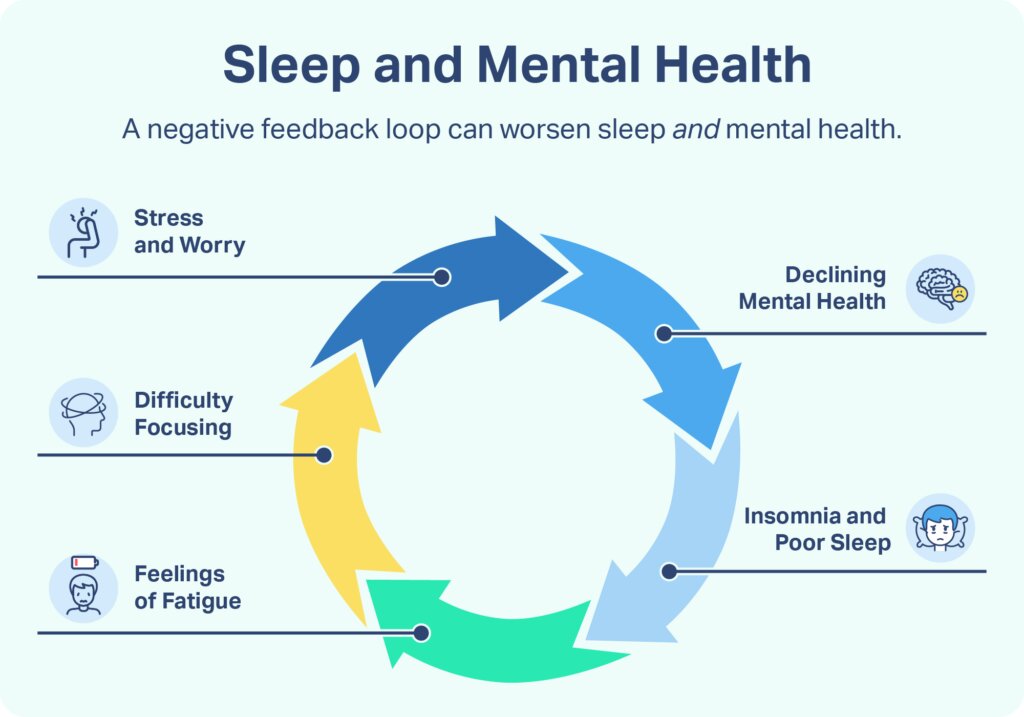A Quick Guide
This article delves into the complex relationship between depression and sleep, offering insight into their bidirectional relationship. We’ll look at how depression can interfere with sleep patterns, as well as how poor sleep quality might contribute to the development or worsening of depression.
Introduction
Depression and sleep are inseparably linked, resulting in a complex relationship that has a substantial impact on an individual’s overall well-being. According to research, there is a bidirectional relationship between the two, emphasizing the significance of addressing both elements for optimal mental health care.
The Effects of Depression on Sleep
Sleep disturbances are a common symptom of depression. Individuals suffering from depression may experience insomnia, which is characterized by difficulties sleeping or staying asleep. On the other hand, some people may experience hypersomnia, which is an overwhelming need for sleep that does not relieve fatigue. These interruptions can intensify feelings of despair and hopelessness, resulting in an unhealthy cycle.
How sleep affects mental health
Poor sleep quality, on the other hand, can lead to the development or worsening of depression. Sleep is essential for emotional control, cognitive function, and overall mental well-being. Sleep disruption can lead to increased stress, emotional instability, and difficulties coping with life’s obstacles, all of which contribute to the start of depression.
Physiological Mechanisms
Hormones and neurotransmitters
Depression and sleep are closely linked to neurotransmitters such as serotonin, which regulates mood, and melatonin, which regulates the sleep-wake cycle. Imbalances in these hormones can impair sleep and emotional well-being, resulting in a self-perpetuating cycle of distress.
Circadian Rhythm Disruptions
Depression can disrupt the circadian rhythm, the internal clock that regulates sleep-wake cycles in the body. Disruptions in this rhythm might result in erratic sleeping patterns, aggravating depressed symptoms. A consistent sleep schedule and regular exposure to daylight can help manage the circadian rhythm, improving both sleep and mood.

Psychological Factors
Negative Thought Patterns
Depression frequently causes negative thought patterns to intensify at night, making it difficult for people to relax and fall asleep. Cognitive-behavioral therapy (CBT) has been beneficial in addressing these habits, providing practical techniques to break the loop of negative thinking and promote sleep.
Sleep Anxiety and Depression
Sleep anxiety, or the worry of not being able to sleep, is common in people who suffer from depression. This anxiousness might lead to a vicious cycle that worsens sleep quality. Mindfulness practices, relaxation exercises, and a calming nighttime routine can all aid in the reduction of sleep-related anxiety.
How to Manage Depression & Improve Sleep?
Establish Healthy Sleep Habits
Creating a sleep-friendly atmosphere, sticking to a consistent sleep schedule, and avoiding stimulants like caffeine and electronics before bedtime can all help to enhance sleep quality. These habits, known together as sleep hygiene, are critical in the management of both depression and sleep problems. Before going to bed, do something peaceful like reading a book, taking a warm bath, or completing relaxation exercises. Make your bedroom sleep-friendly by keeping it cold, dark, and quiet. To improve overall sleep quality, invest in a comfortable mattress and pillows.
Limit stimulants & concentrate on your diet
Reduce or eliminate caffeine and nicotine consumption, especially in the hours before bedtime. While alcohol may initially induce sleep, it might disturb sleep patterns later in the night, lowering overall sleep quality. Maintain a healthy diet that is high in fruits and vegetables, whole grains, and lean meats. Avoid large meals near bedtime and try including sleep-promoting foods such as nuts, seeds, and dairy.
Regular Physical Activity
Regular exercise has been linked to better sleep and less depression. Physical activity releases endorphins, the body’s natural mood lifters, and improves sleep. Incorporating exercise into one’s daily routine might be a helpful strategy in dealing with these interconnected issues. Exercise regularly, aiming for at least 30 minutes on most days of the week.
Mindfulness & Relaxation Techniques & Journaling
To calm the mind and lessen anxiety, try mindfulness meditation, deep breathing exercises, or progressive muscle relaxation. Beginners can benefit from apps and guided sessions, which are widely available. Keep a journal to record your feelings and thoughts. Journaling can aid in the identification of patterns, triggers, and areas for improvement, resulting in significant insights for both sleep and mental health.
Social Connections
Maintain relationships with others and participate in activities that you enjoy. Positive social connections can ease symptoms of sadness and are associated with better mental health. Having a strong support system can provide emotional support during difficult times and reduce feelings of isolation. Engaging in social activities also promotes a sense of belonging and can improve overall well-being.
Seeking Professional Help
While lifestyle changes might have an influence, it is critical to recognize when professional intervention is required. Therapists and psychiatrists, for example, can give individualized techniques for managing both depression and sleep difficulties. Combining therapy approaches with lifestyle changes frequently produces the most beneficial results. Consider Cognitive-Behavioral Therapy for Insomnia (CBT-I), a type of therapy that is specifically developed to treat insomnia and improve sleep habits. CBT-I focuses on reducing negative thoughts and behaviors that interfere with sleep.
Remember that implementing these tips may take some time and consistency. It is critical to approach these changes carefully and to seek help when necessary. Everyone’s journey is unique, and determining the best combination of strategies is a personal experience.
Key Takeaways
To summarise, the relationship between depression and sleep is complex and nuanced. Recognizing the bidirectional relationship and comprehending the physiological and psychological mechanisms at work is critical for those who want to enhance their mental health. Individuals can escape the cycle of sleep disturbance and depression by applying practical tips and, when necessary, getting professional help, paving the road for a better and more rewarding life.
References


